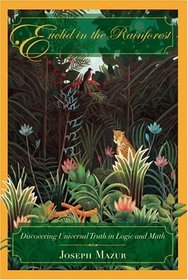Search -
Euclid in the Rainforest : Discovering Universal Truth in Logic and Math
Euclid in the Rainforest Discovering Universal Truth in Logic and Math
Author:
How do we know that something is true? How do we know that things really are what they seem? Many people think math and science are the ultimate authorities on reality. Math defines abstract, universal truths; scientific truths are established by experiments in the real world-but underlying both kinds of knowledge is logic. In 'Euclid in the Rai... more »
Author:
How do we know that something is true? How do we know that things really are what they seem? Many people think math and science are the ultimate authorities on reality. Math defines abstract, universal truths; scientific truths are established by experiments in the real world-but underlying both kinds of knowledge is logic. In 'Euclid in the Rai... more »
ISBN-13: 9780131479944
ISBN-10: 0131479946
Publication Date: 10/4/2004
Pages: 352
Rating: 1
ISBN-10: 0131479946
Publication Date: 10/4/2004
Pages: 352
Rating: 1
5 stars, based on 1 rating
Publisher: Pi Press
Book Type: Hardcover
Other Versions: Paperback
Members Wishing: 0
Reviews: Amazon | Write a Review
Book Type: Hardcover
Other Versions: Paperback
Members Wishing: 0
Reviews: Amazon | Write a Review
Genres:
- Science & Math >> Mathematics >> General
- Science & Math >> Mathematics >> Pure Mathematics >> Logic
- Engineering & Transportation >> Professional Science >> Mathematics >> Pure Mathematics >> Logic




